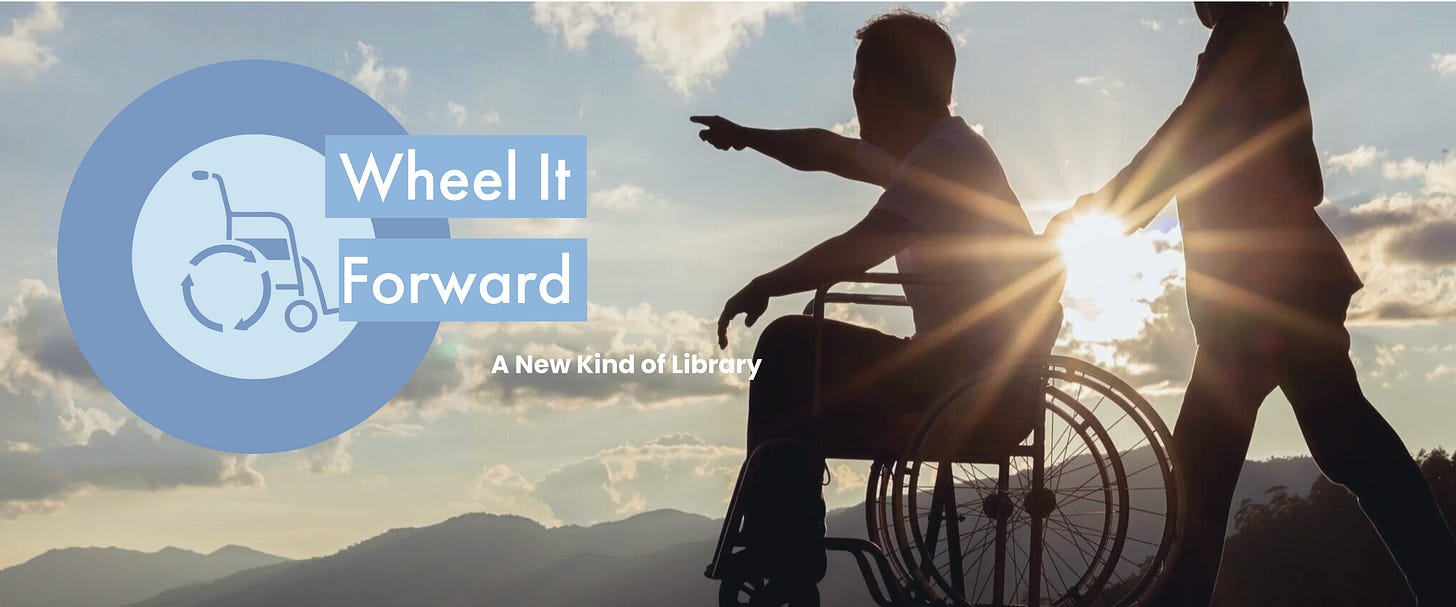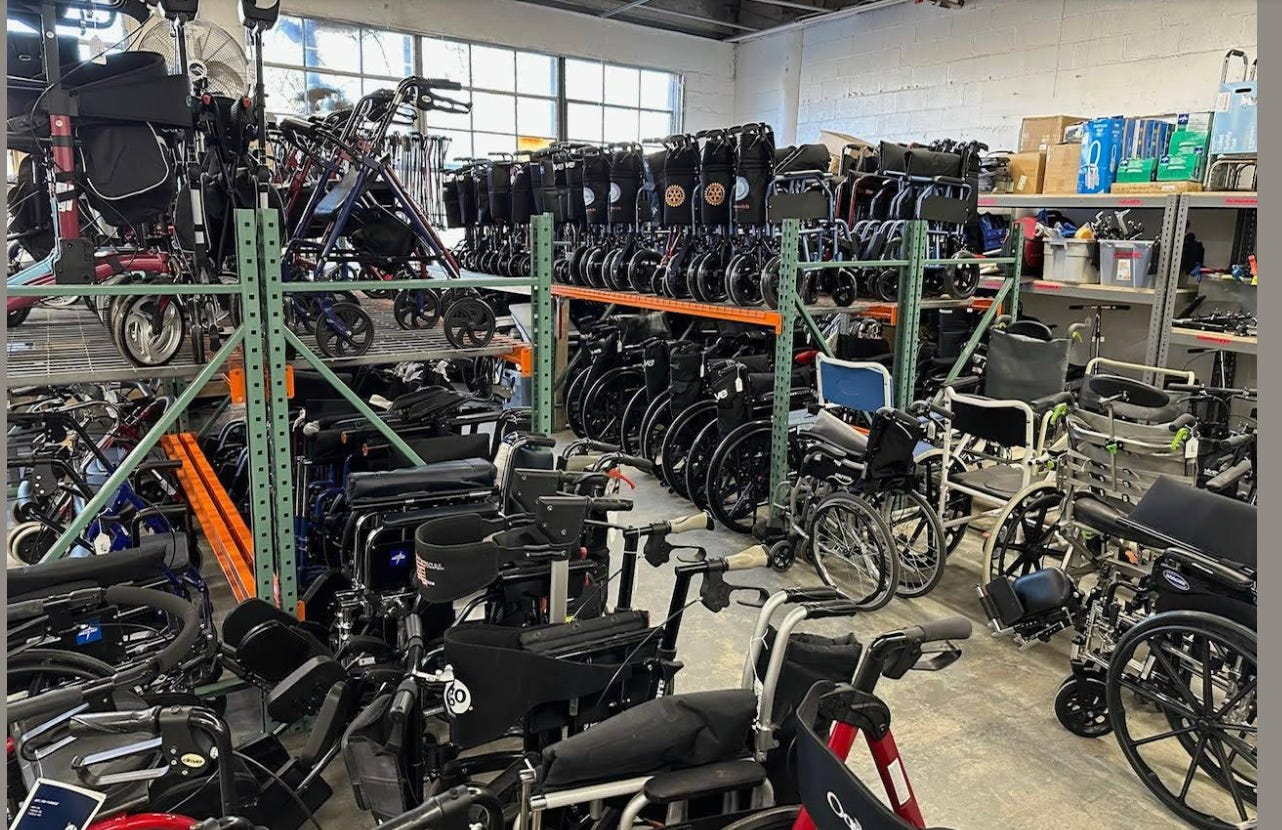Forward Thinking
Elliot Sloyer had an idea. Thousands of people's lives are better because of it.
Six weeks ago, Sharon Lewis had a nasty accident. It left her with an ankle that was broken in three places and required surgical repair. The surgery was successful, but now Lewis had other needs to manage life through her recuperation.
A wheelchair and two knee scooters (one for each floor of her home). Crutches. A shower chair, and a table on wheels – the kind you see in hospital rooms. Lewis lives in Stamford, Conn., not far from a warehouse for a nonprofit called Wheel It Forward. With one phone call, she got everything she needed.
“The people who work and volunteer at Wheel It Forward are so kind and thoughtful,” Lewis said. “Everything I needed was right there and that really lessened my anxiety.”
Debra Feldman had a similar experience a few years ago, after she had a hip replacement and was looking for a walker and a shower chair. Her daughter had seen a Facebook post about a place that might be able to help her. Feldman looked up Wheelitforwardusa.org. In a matter of days had her equipment. When she no longer needed it, Feldman drove it back to the warehouse.
“It was great. It was easy. I thought, ‘This is a wonderful idea,’” Feldman said.
Debra Feldman has since become one of Wheel It Forward’s volunteers, most of whom work at the organization’s three Connecticut warehouses in Stamford, Bridgeport and Newtown. (A fourth will soon be opened in North Haven.) She is on the front lines of a staggering philanthropic success story that all started with a trip to Israel, a Wall Street lifer and a completely unscripted epiphany.
In its five years of existence, Wheel It Forward (WIF) has loaned out 22,000 pieces of durable medical equipment (DME) worth an estimated $4 million. Last month alone, it loaned 500 pieces to about 300 individuals, the items running the gamut from a full electric hospital bed to a commode. Between people who donate equipment and those who receive it, WIF will touch the lives of 8,000 people in Connecticut this year. There is a suggested donation for each item borrowed, but it is entirely optional.
“We’ve never said no to anybody,” Elliot Sloyer said.
Sloyer is the aforementioned Wall Street guy, and a longtime Stamford resident. In the height of the pandemic, he was approached by a school in Fairfield County to see if he would be interested in being a chaperone for 30 eighth-graders on a month-long trip to Israel. Sloyer was flattered, but his financial background had cultivated an aversion to risk-taking, and few things struck him as riskier than being responsible for 30 of other people’s children for a month-long trip to the Middle East. So he declined the invitation and the school found another chaperone, only to have that person back out just weeks before departure. The school circled back. Sloyer agreed to be the pinch-chaperone.
One day on the trip, the students visited Yad Sarah, a volunteer-run organization that provides DME for all segments of the Israeli population – Jews, Muslims and Christians - regardless of income status or age. If you live in Israel and need medical equipment, you likely have connected with Yad Sarah.
Sloyer, 61, has always been fascinated by libraries, and their efficacy in making books, films and so many other resources available to communities at large. What was Yad Sarah if not, effectively, a library for DME? Upon returning home (with all 30 kids), Sloyer began to brainstorm the idea with friends, select business associates and people in the community. He did a deep dive into the field and discovered that in virtually all corners of the U.S., the only way to get DME without buying it was through a patchwork of so-called lending closets, informal storage spaces that might be in a local senior center, town or county office or a medical facility. The system – if you can call it that – was cumbersome, frustrating and in most cases, a deeply inefficient way to help people who were already stressed by dealing with their health challenges.
The more Sloyer thought about it, the more sense it made. His research told him that the typical piece of DME has a usable life span of 5+ years, but is only needed for an average of four months. Wheel It Forward set forth its mission – “to create and operating a lending library where people who need durable medical equipment can borrow it, and where people who have lightly used DME can donate it to benefit others, and the environment.” Sloyer estimates that WIF has kept more than 200 tons of beds, wheelchairs and walkers out of landfills. Every donated piece in the warehouse is professionally refurbished and sanitized before it goes back out.
“By not wasting things and throwing them away, Wheel It Forward is able to meet the needs of the greater society,” Feldman said.
Like Yad Sarah, Wheel It Forward was an all-volunteer operation at its inception, but it grew so quickly that paid staff was needed at the warehouses – the places where WIF’s goods are borrowed and donated. The three warehouses have operations managers (a fourth is being hired for the North Haven location). Outside contractors are hired to do the refurbishing and sanitizing. Thirty volunteers, 20 of whom have special needs or are disabled, take on assorted other tasks. WIF’s annual $500,000 operating budget is funded in roughly equal thirds by suggested donations, grants and an end-of-year fundraiser.
Part of WIF’s vision is take away the stigma of using second-hand medical items, making clean, high-quality equipment readily available to people of all socio-economic backgrounds. As significant an impact the organization has had in Connecticut, it doesn’t want to stop there; organizers have established a website called GotDME.org that serves as a database for sources of DME all over the country. If you live in Laramie, Wyoming and need a cold-therapy machine or a power lift recliner, you might try Wyoming Assistive Technology Resources.
Sloyer is quick to give credit to his board of directors, operations managers, volunteers and the thousands of people who have donated money and/or equipment. He doesn’t want the story to be about him. Lots of people do lots of heavy lifting, he says. Together they have an ultimate goal of having a DME library in every town that has a traditional library. Who knew that being a chaperone could impact so many lives?
“I’m thankful we’ve been able to help a lot of people,” Sloyer said.




This is such a great concept. I’m gonna look through my equipment from when I broke my foot while I’m home at Christmas time. I just checked the website and there are plenty of places to donate in the Northeast Ohio area.
What a wonderful concept! As someone who has acquired a lot of DME’s in the last year, I’m always listening for someone who might need something that is now just sitting at my home, and used for only 4-5 months. Think I will click on that link and see if there’s a company like that near me that I could donate all of my goods to help someone else out. Great story!